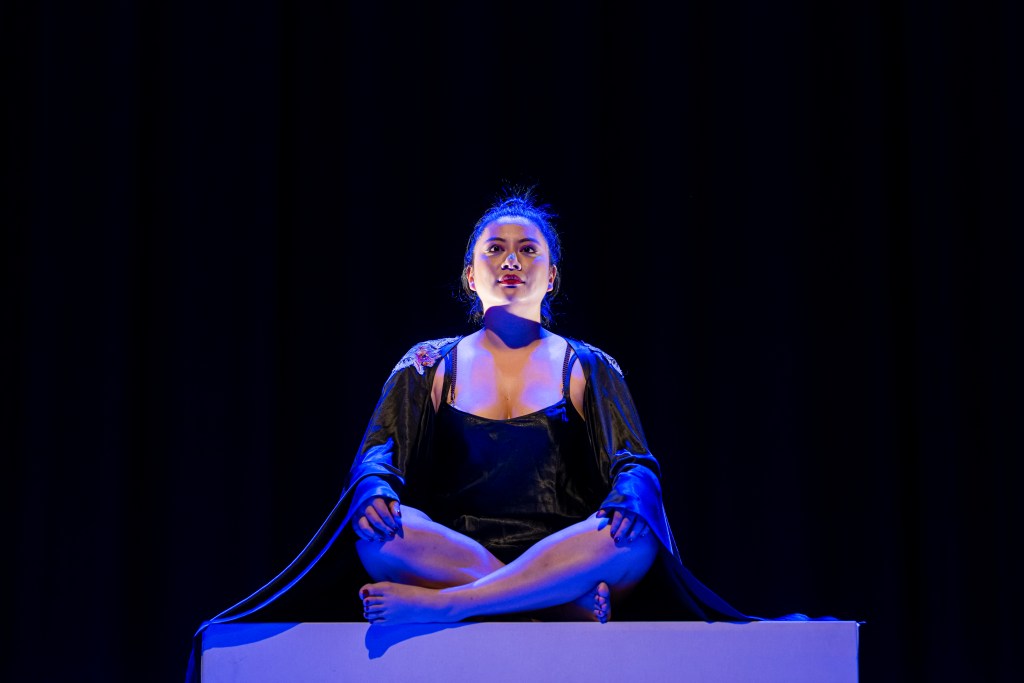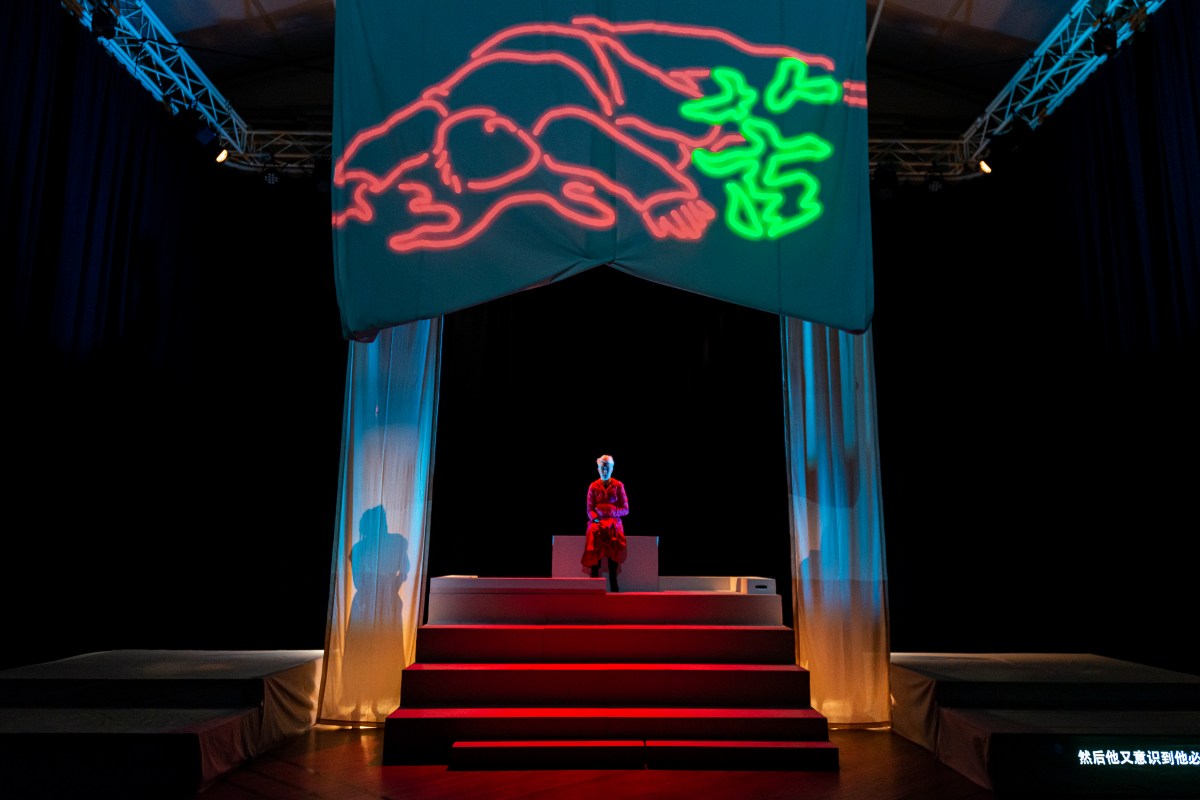Playwright Joe Paradise Lui combines Buddhist mythology and contemporary social commentary in his queer thriller romance, Enlightenment (The Enlightenment of the Siddhartha Gautama Buddha, and the Encounter with the Monkey King, Great Sage, Equal of Heaven).
Directed by Marcel Dorney, Enlightenment is an intense adventure in which young prince Siddhartha Gautama (Sid) and the Monkey King (Sage) appear as modern Australian women, entrancingly played by Alice Qin and Merlynn Tong, respectively.
Siddhartha Gautama, commonly known as The Buddha, is remembered as the founder of Buddhism. Enlightenment’s vivacious Sid (Qin) appears as a sensuous subversion of the traditionally ascetic figure in this modern Jataka-style tale, in which the Buddha’s past life is recounted in order to reveal a moral maxim.
The character of the Monkey King has had many incarnations over time, most notably Monkey (from Monkey Magic) and the anime character, Goku, both of which originate from Wu Cheng’en’s classic Journey to the West. Enlightenment’s Monkey King, Sage (Tong), retains the mischievousness of the classical Chinese anti-hero, with intoxicating layers of anger and attitude.
Beginning with a framing story that bleeds into the edges of the main narrative, Enlightenment elicits laughter in the first 30 seconds. Before long, music crescendos and lights flash as two people climax on opposite ends of the stage – their closeness-yet-distance thematically resonant. Here, we meet Sid – who is tired of experiencing desire, emptiness and boredom in the midst of luxury – and Brad, a morally ambiguous policeman who sees himself as the good guy.
Sid and Brad part ways immediately, because Sid never hooks up twice. That is, until she meets Sage, whose cheerfully aggressive manner and dark-but-funny remarks have made her infamous via the internet. Scenes surrounding Sage’s viral video highlight the hypocrisy of performative tragedy that acts as a conduit for validating feelings of outrage while minimising issues endemic to systemic injustice, beautifully critiquing the superficiality of social media.
Sid wants to tame Sage, but playing the part of the benevolent saviour has its limits, particularly when coupled with idealistic naivety and unchecked privilege. To Sid’s surprise, she falls in love.
Brad’s misogynistic work partner, Steve, is a power-hungry corrupt cop, with offensive pick-up lines and a fragile male ego. Brad makes excuses on Steve’s behalf, wilfully blind to the obvious truth, in an all-too-familiar form of rationalised complicity.

When Sage’s rage meets Steve’s entitlement, suffering ensues, compounded by the destructive consequences of succumbing to desire. According to Buddhist tradition, the source of all suffering is desire, and Steve’s desire causes suffering to all, in a perverted example of doing-unto-others. Entitlement is dashed and reality is checked in a parable of tyranny having gone too far.
Sage turns to Sid for assisted salvation, but the double-edged sword of magic and the agony of betrayal combine to complicate matters for both of them. Sid becomes Sage’s rock, so to speak, although not in the usual way. But who are the privileged to tell the marginalised how to be right? Enlightenment comes as a shock to the system after eras of relative darkness.
Every actor artfully encapsulates extremes of context and emotion, with exemplary delivery and hilarious nuance. Emily Tomlins shines across multiple roles, driving the story forward with a powerfully peaceful presence. Conor Gallacher is magnificently detestable as Steve, and John Marc Desengano embodies Brad with personable humour. Tong and Qin are outstanding as Sage and Sid; their magnetic performances are deserving of accolades. Tong’s rebellious ferocity and Qin’s expressive sensuality speak to the range of their talents, both respectively, and in tandem.
Enlightenment features illustrations by 巴丢草 (Badiucao), a Chinese artist/activist whose work challenges aspects of censorship, dictatorship and historical gaslighting. Badiucao, formerly an incognito artist, has been in exile in Australia since his identity was revealed in Danny Ben-Moshe’s 2019 documentary, China’s Artful Dissident. Projections of Badiucao’s artwork complement and enhance an already imaginative set design, comprising changeable platforms and dramatically utilised banners.
A donut motif recurs throughout, with several symbolic interpretations. Other vivid Badiucao imagery includes tyre tracks reminiscent of the Tiananmen Square massacre, a concerning application of chopsticks and an eggplant/peach (if you know, you know). In contrast to the vibrancy of artwork and lighting, Enlightenment’s intermittent use of audio-only performance is surprisingly confronting, drawing attention to the invisible lines between right and wrong action.
Read: Exhibition Review: Alice in Wonderland, WA Museum
This self-referential story is an intelligent tale of systemic injustice that emphasises the importance of compassion, purpose and righteousness. It will resonate with those who want to follow the Noble Eightfold Path – preferably a cappella, and with delightful real-time autotune.
Enlightenment is performed in English, with projected Mandarin subtitles. Coarse language and depictions of sexual assault are prevalent, making the play most suitable for audiences 15 years and older.
Enlightenment, State Theatre Centre of Western Australia (STCWA), WA
Writer, Sound and Lighting Designer: Joe Paradise Lui
Director: Marcel Dorney
Cultural Consultant: Jamie Lewis
Illustrator: 巴丢草 (Badiucao)
Production Designer: Cherish Marrington
Stage Manager (WA): Catherine O’Donoghue
Production Manager: Rose Pidd
Producer: Adelaide Fisher
AV Assistant: Hardik Mehta
Mandarin Surtitles: Kevin Chian
Actors: Merlynn Tong, Alice Qin, John Marc Desengano, Conor Gallacher and Emily Tomlins
Performed in English with Mandarin subtitles
Elbow Room’s production of Enlightenment was performed 15-17 December 2022 in WA and will have a Naarm/Melbourne season at Northcote Town Hall in Melbourne from 10-20 March 2023.





